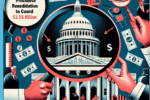New York, NY – Billionaire investor Ray Dalio recently issued a warning about a potential crisis far worse than a recession. In a recent interview, Dalio expressed concerns about the state of the global economy and the increasing wealth gap that could lead to significant social and political unrest.
Dalio, the founder of Bridgewater Associates, highlighted the need for systemic reform to address the growing economic disparities and the rise of populism around the world. He emphasized the importance of policymakers and leaders taking proactive measures to prevent a major economic collapse.
The investor’s warning comes at a time when many experts are already predicting a global recession due to various factors such as trade tensions, geopolitical uncertainties, and slowing economic growth. Dalio’s cautionary statements serve as a wake-up call for countries to address underlying issues that could exacerbate an already fragile economic environment.
According to Dalio, the current economic system is not sustainable in the long run, and significant changes are needed to ensure a more equitable distribution of wealth and resources. He called for a more inclusive approach to economic policy-making that takes into account the needs of all stakeholders, not just the wealthy elite.
Dalio’s remarks have sparked a debate among economists and policymakers about the best course of action to prevent a potential economic crisis. Some argue for increased government intervention and regulation to address income inequality and promote sustainable economic growth, while others advocate for a more hands-off approach to allow markets to self-regulate.
As the global economy faces mounting challenges, Dalio’s warning serves as a timely reminder of the importance of addressing underlying structural issues to prevent a future crisis. His insights into the risks of unchecked wealth disparity and the potential consequences of inaction should prompt policymakers and leaders to reevaluate their economic policies and priorities.










